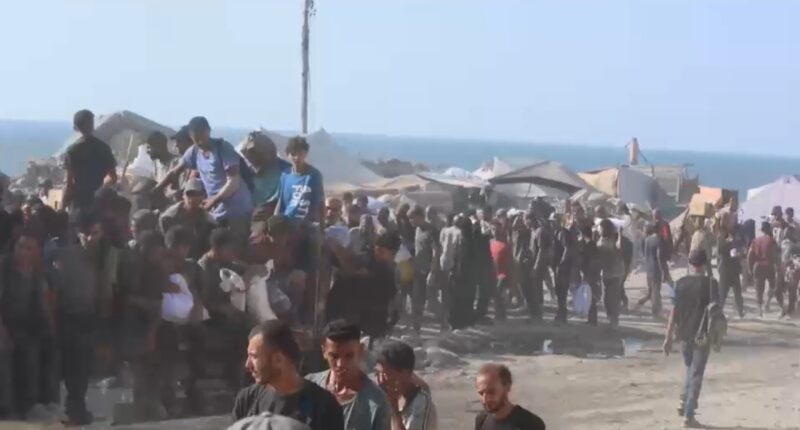Share this @internewscast.com
JERUSALEM — Early on Friday, Israel announced its intention to seize control of Gaza City, marking a significant intensification in its 22-month-long conflict with Hamas. This decision followed a late-night meeting with top officials. The plan prompted rejection from Palestinians, increased international pressure to halt the conflict, and sparked concerns within Israel about hostages still being held by Hamas.
The ongoing air and ground assaults by Israel have already caused the deaths of tens of thousands in Gaza, led to the displacement of most residents, devastated large areas, and brought the region to the brink of famine. A new major ground offensive is likely to worsen the already dire humanitarian situation.
Hamas rebuffed Netanyahu’s plans in a statement and said people in Gaza would “remain defiant against occupation.”
“Expanding of aggression against our Palestinian people will not be a walk in the park,” the group said.
RELATED: What to know as Israel considers reoccupying Gaza in what would be a major escalation of the war
Netanyahu has signaled plans for even broader war
Prime Minister Benjamin Netanyahu, in a Thursday interview with Fox News, detailed broader strategies, indicating Israel’s aim to take over all of Gaza. Currently, Israel controls approximately three-quarters of the razed territory.
After the Security Cabinet’s Thursday night meeting, Israel’s announced plan was somewhat less extensive than Netanyahu’s earlier statements, potentially as a strategy to pressure Hamas into accepting a ceasefire on Israel’s terms.
The plan may also reflect caution from Israel’s top general, who has reportedly warned that expanding military operations could jeopardize the lives of the remaining hostages held by Hamas and further tax Israel’s military forces, which have been engaged in regional conflicts for nearly two years.
According to a statement from Netanyahu’s office following the meeting, the military will “prepare to take control of Gaza City while providing humanitarian aid to civilians outside the combat zones.”
‘There is nothing left to occupy’
Israel has repeatedly bombarded Gaza City and carried out numerous raids there, only to return to different neighborhoods again and again as militants regrouped. Today, it is one of the few areas in Gaza that hasn’t been turned into an Israeli buffer zone or placed under evacuation orders.
A major ground operation there could displace tens of thousands of people and further disrupt efforts to deliver food to the hunger-stricken territory.
It’s unclear how many people reside in the city, which was Gaza’s largest before the war. Hundreds of thousands fled Gaza City under evacuation orders in the opening weeks of the war, but many returned during a ceasefire at the start of this year.
Palestinians were already anticipating even more suffering ahead of the decision, and at least 42 were killed in Israeli airstrikes and shootings on Thursday, according to local hospitals.
Israel’s military offensive has killed over 61,000 Palestinians, according to Gaza’s Health Ministry, which does not say how many were fighters or civilians. The ministry is part of the Hamas-run government and staffed by medical professionals.
The United Nations and independent experts view the ministry’s figures as the most reliable estimate of casualties. Israel has disputed them without offering a toll of its own.
“There is nothing left to occupy,” said Maysaa al-Heila, who is living in a displacement camp. “There is no Gaza left.”
‘We don’t want to keep it’
Asked in the interview with Fox News ahead of the Security Cabinet meeting if Israel would “take control of all of Gaza,” Netanyahu replied: “We intend to, in order to assure our security, remove Hamas (from) there.”
“We don’t want to keep it. We want to have a security perimeter,” Netanyahu said in the interview. “We want to hand it over to Arab forces that will govern it properly without threatening us and giving Gazans a good life.”
Hamas official Osama Hamdan told Al Jazeera on Thursday that the group would view Netanyahu’s proposal of an Arab-led force in post-war Gaza as linked to Israel. He warned it could further “plunge the region into new trouble.”
Israel’s military chief of staff, Lt. Gen. Eyal Zamir, warned against occupying Gaza, saying it would endanger the hostages and put further strain on the military after nearly two years of war, according to Israeli media reports on the closed-door Security Cabinet meeting.
Hamas-led militants abducted 251 people and killed around 1,200 in the Oct. 7, 2023, attack that triggered the war. Most of the hostages have been released in ceasefires or other deals but 50 remain inside Gaza. Israel believes around 20 of them to be alive.
Israeli opposition leader Yair Lapid said on Friday that the cabinet’s plan would endanger them and would not advance Israel toward its objectives.
“This is exactly what Hamas wanted: for Israel to be mired on the ground with no purpose, without defining the dayafter picture, in a pointless occupation that no one understands where it is leading,” he said in a statement on X.
Shurafa reported from Deir al-Balah, Gaza Strip and Krauss from Ottawa, Ontario.
Copyright © 2025 by The Associated Press. All Rights Reserved.

















